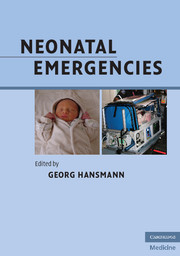Book contents
- Frontmatter
- Contents
- List of contributors
- Foreword (1)
- Foreword (2)
- Preface
- Acknowledgments
- Section 1 Organization of neonatal transport
- Section 2 Basics in cardiopulmonary resuscitation of newborn infants
- Section 3 Classic and rare scenarios in the neonatal period
- Management of healthy, term newborn infants (vaginal delivery, cesarean section, vacuum extraction, forceps delivery)
- Management of preterm and moderately depressed term newborn infants with a birth weight ≥1500 g
- Management of very preterm newborn infants (VLBW, ELBW)
- Twin–twin (feto–fetal) transfusion syndrome
- An apparently trivial call from the term baby nursery
- Out of hospital birth
- Hypoglycemia
- Meconium aspiration
- Chorioamnionitis and early-onset sepsis in the newborn infant
- Perinatal hemorrhage
- Perinatal hypoxia-ischemia
- Cerebral seizures
- Infants born to mothers on psychoactive substances
- Prenatal and postnatal arrhythmias
- Critical congenital cardiovascular defects
- Patent ductus arteriosus of the preterm infant
- Persistent pulmonary hypertension of the newborn (PPHN)
- Congenital diaphragmatic hernia
- Pneumothorax
- Congenital cystic adenomatoid malformation of the lung (CAM, CCAM)
- Chylothorax
- Hemolytic disease of the newborn
- Hydrops fetalis
- Choanal atresia
- Esophageal atresia
- Gastrointestinal obstruction
- Necrotizing enterocolitis (NEC)
- Omphalocele and gastroschisis
- Neural tube defects
- Cleft palate
- Birth trauma: brachial plexus palsy, facial nerve palsy, clavicular fracture, skull fracture, intracranial and subperiosteal hemorrhage (cephalohematoma)
- Sudden infant death syndrome (SIDS)
- Questions for review
- References (Section 3)
- Section 4 Transport
- Section 5 Appendix
- Index
- Plate section
Hydrops fetalis
from Section 3 - Classic and rare scenarios in the neonatal period
Published online by Cambridge University Press: 05 March 2012
- Frontmatter
- Contents
- List of contributors
- Foreword (1)
- Foreword (2)
- Preface
- Acknowledgments
- Section 1 Organization of neonatal transport
- Section 2 Basics in cardiopulmonary resuscitation of newborn infants
- Section 3 Classic and rare scenarios in the neonatal period
- Management of healthy, term newborn infants (vaginal delivery, cesarean section, vacuum extraction, forceps delivery)
- Management of preterm and moderately depressed term newborn infants with a birth weight ≥1500 g
- Management of very preterm newborn infants (VLBW, ELBW)
- Twin–twin (feto–fetal) transfusion syndrome
- An apparently trivial call from the term baby nursery
- Out of hospital birth
- Hypoglycemia
- Meconium aspiration
- Chorioamnionitis and early-onset sepsis in the newborn infant
- Perinatal hemorrhage
- Perinatal hypoxia-ischemia
- Cerebral seizures
- Infants born to mothers on psychoactive substances
- Prenatal and postnatal arrhythmias
- Critical congenital cardiovascular defects
- Patent ductus arteriosus of the preterm infant
- Persistent pulmonary hypertension of the newborn (PPHN)
- Congenital diaphragmatic hernia
- Pneumothorax
- Congenital cystic adenomatoid malformation of the lung (CAM, CCAM)
- Chylothorax
- Hemolytic disease of the newborn
- Hydrops fetalis
- Choanal atresia
- Esophageal atresia
- Gastrointestinal obstruction
- Necrotizing enterocolitis (NEC)
- Omphalocele and gastroschisis
- Neural tube defects
- Cleft palate
- Birth trauma: brachial plexus palsy, facial nerve palsy, clavicular fracture, skull fracture, intracranial and subperiosteal hemorrhage (cephalohematoma)
- Sudden infant death syndrome (SIDS)
- Questions for review
- References (Section 3)
- Section 4 Transport
- Section 5 Appendix
- Index
- Plate section
Summary
Definition
Generalized edema (anasarca) and accumulation of fluid in one or two visceral cavities. Pleural/pericardial effusion(s) or ascites alone is insufficient to establish the diagnosis “hydrops fetalis.” Hydrops may have an immunological (IHF) or a non-immunological (NIHF) cause. See also chapters on “hemolytic disease of the newborn” (HDN, p. 423) and “twin–twin (feto–fetal) transfusion syndrome” (TTTS, p. 240).
Epidemiology
NIHF occurs in approx. 1:1500 to 1:4000 (0.25–0.67/1000) pregnancies.
Etiology/pathophysiology
Immunological hydrops fetalis (IHF)
Feto–maternal Rhesus incompatibility leads to fetal anemia due to hemolytic antibodies and results in hypoxia (central apnea), heart failure, and capillary leak syndrome causing generalized edema, fluid accumulation in visceral cavities, hypoproteinemia, and hepatomegaly of various degrees. Hemolysis and anemia induce or enhance extramedullary erythropoiesis (→ hepatosplenomegaly)
Non-immunological hydrops fetalis (NIHF)
Fetal anemia, hypoxia, hypoproteinemia, and/or heart failure due to multiple possible etiologies lead to generalized edema and effusions
Anemia (hemolytic, non-hemolytic): virus infection (e.g., parvovirus B 19); α-thalassemia; glucose-6-phosphate-dehydrogenase deficiency (G6PDD), fetal leukemia, aplastic anemia, feto–maternal or twin–twin (=feto–fetal) transfusion in monochorial twin pregnancies (p. 240)
Pulmonary causes: chylothorax (p. 419), hydrothorax, congenital diaphragmatic hernia (CDH; p. 404), congenital cystic adenomatoid malformation (CCAM; p. 417), lymphangiectasia, and tumor
Cardiac causes: fetal tachycardia or bradycardia (p. 325), heart failure associated with congenital cardiovascular malformations (p. 340) or myocardial disease (e.g., myocarditis, mitochondrial defects, endomyocardial fibrosis), arteriovenous (AV) and other cardiovascular malformations (p. 340), premature closure of the foramen ovale, thrombosis, and tumor
Infections: toxoplasmosis, rubella, cytomegalovirus, syphilis, hepatitis, adenovirus, leptospirosis, respiratory syncytial virus (RSV), Coxsackie virus, and possibly also hepatitis viruses and HIV (see Table 3.5)
[…]
- Type
- Chapter
- Information
- Neonatal Emergencies , pp. 427 - 431Publisher: Cambridge University PressPrint publication year: 2009



